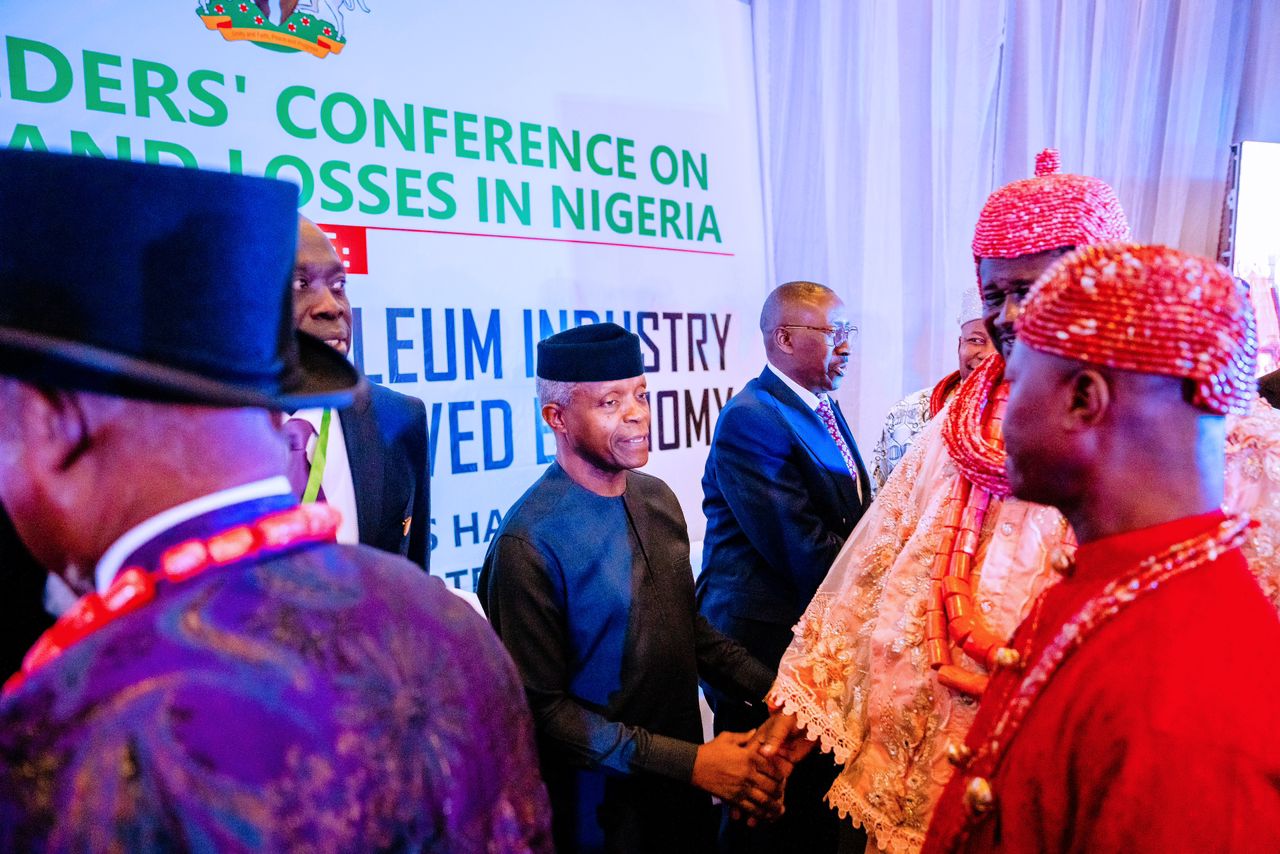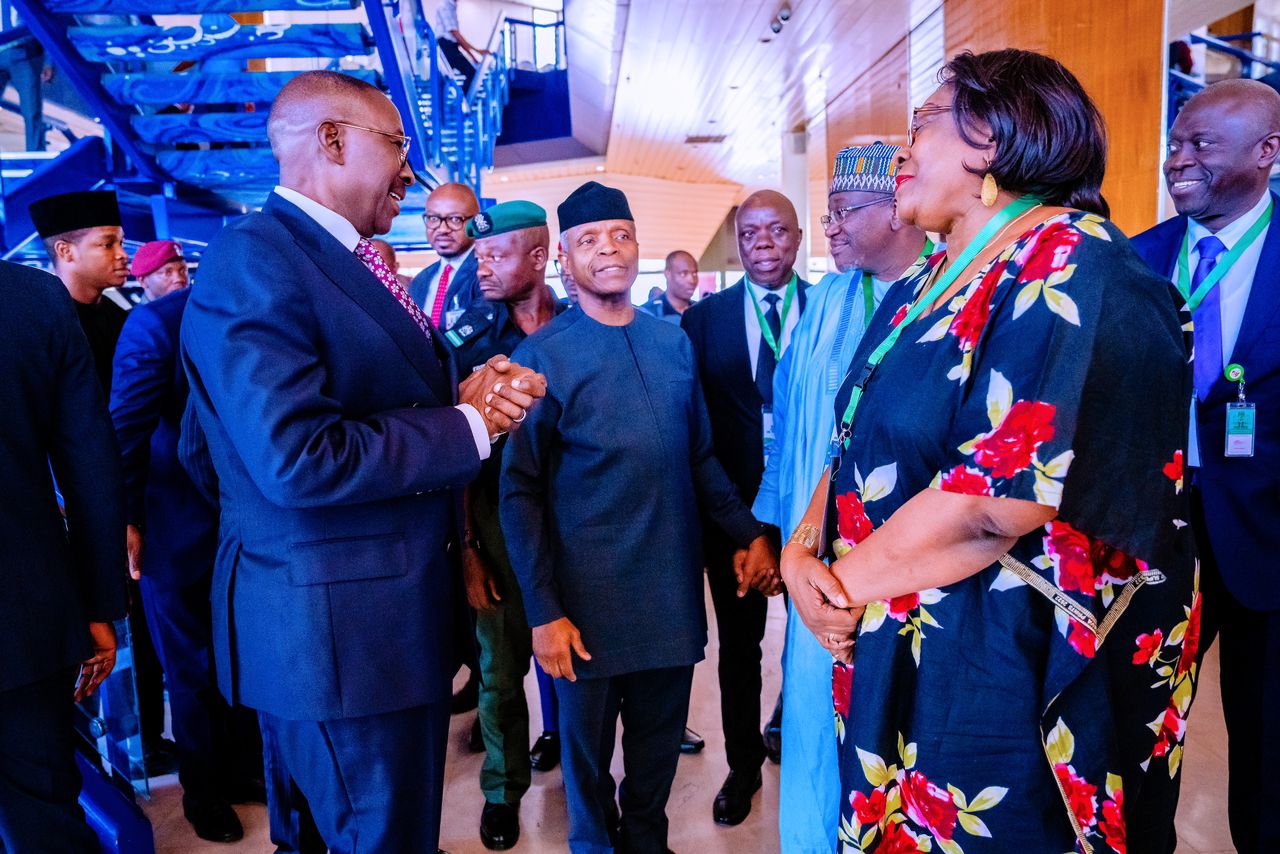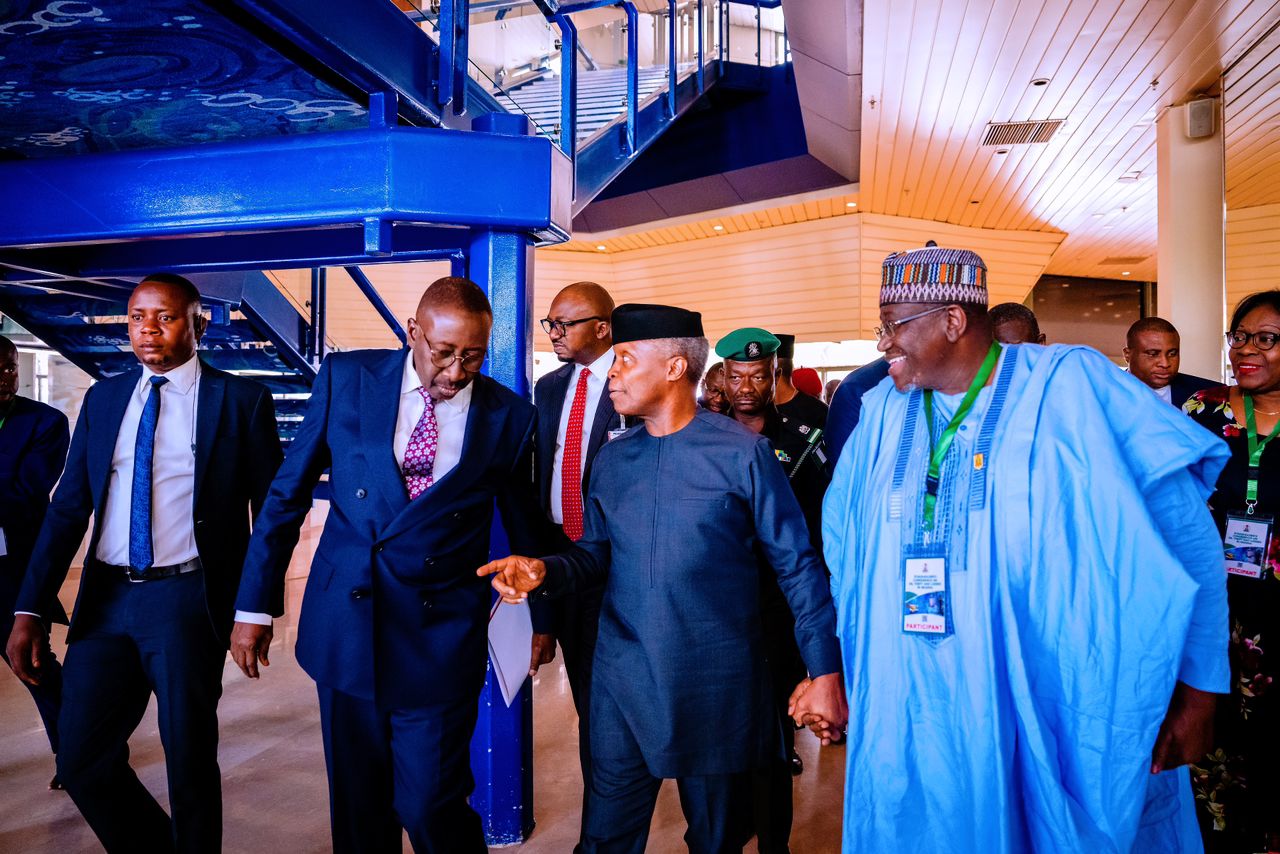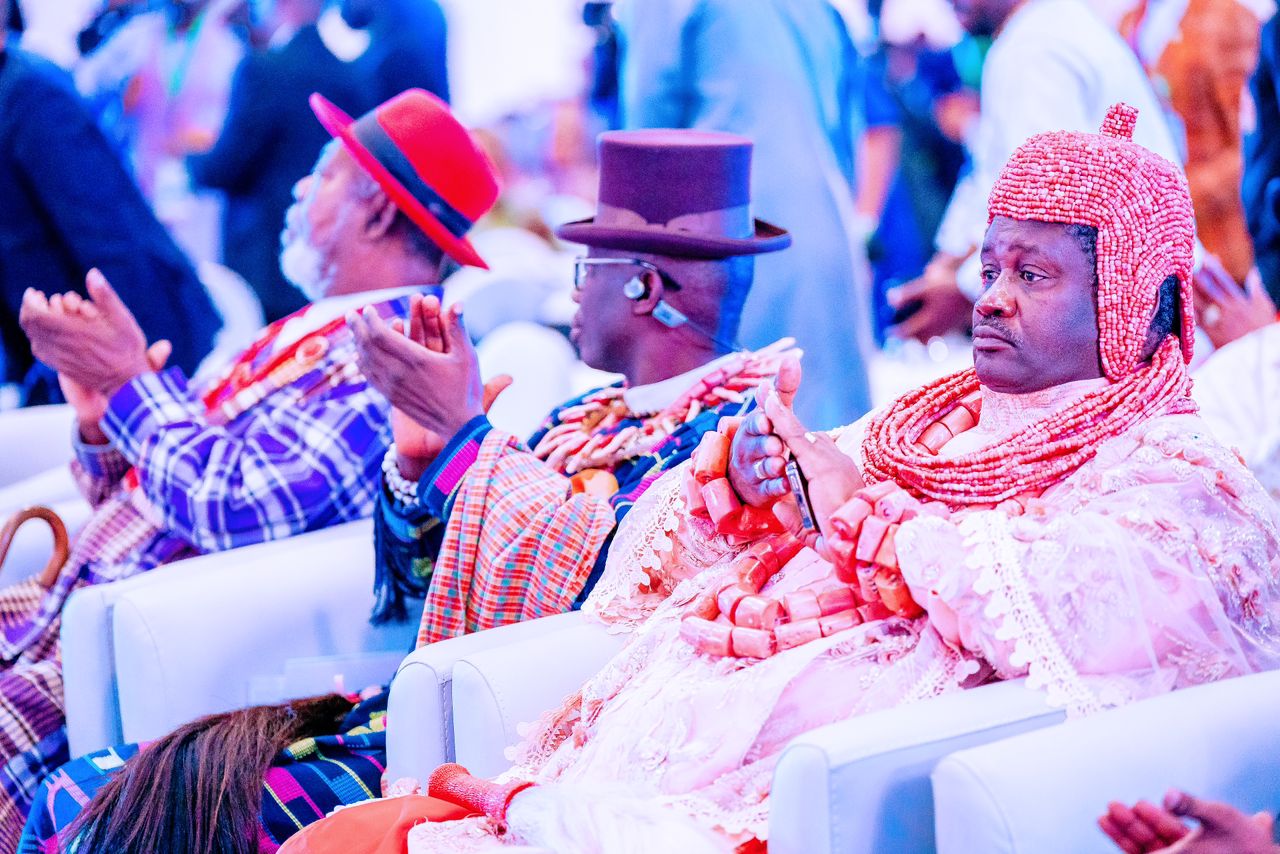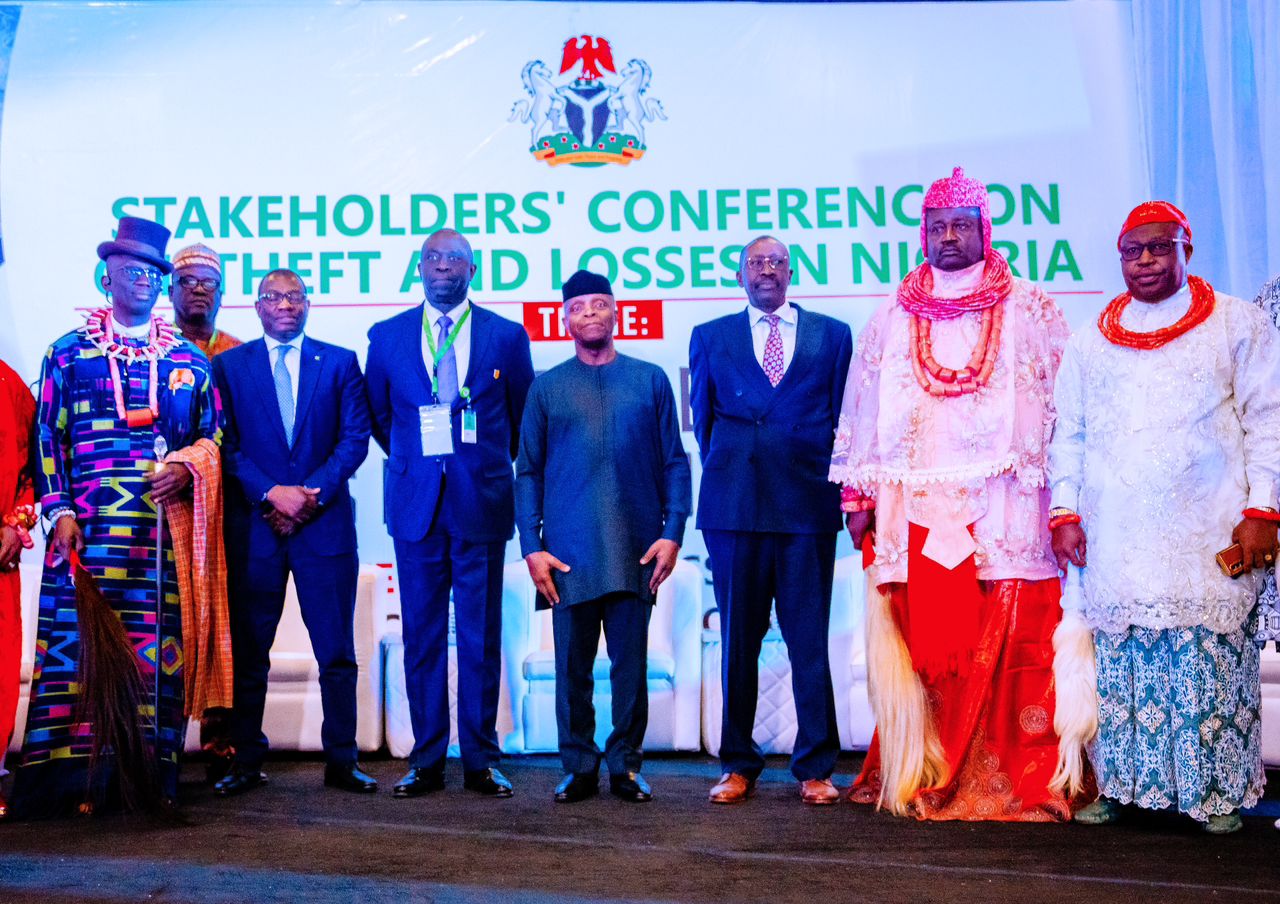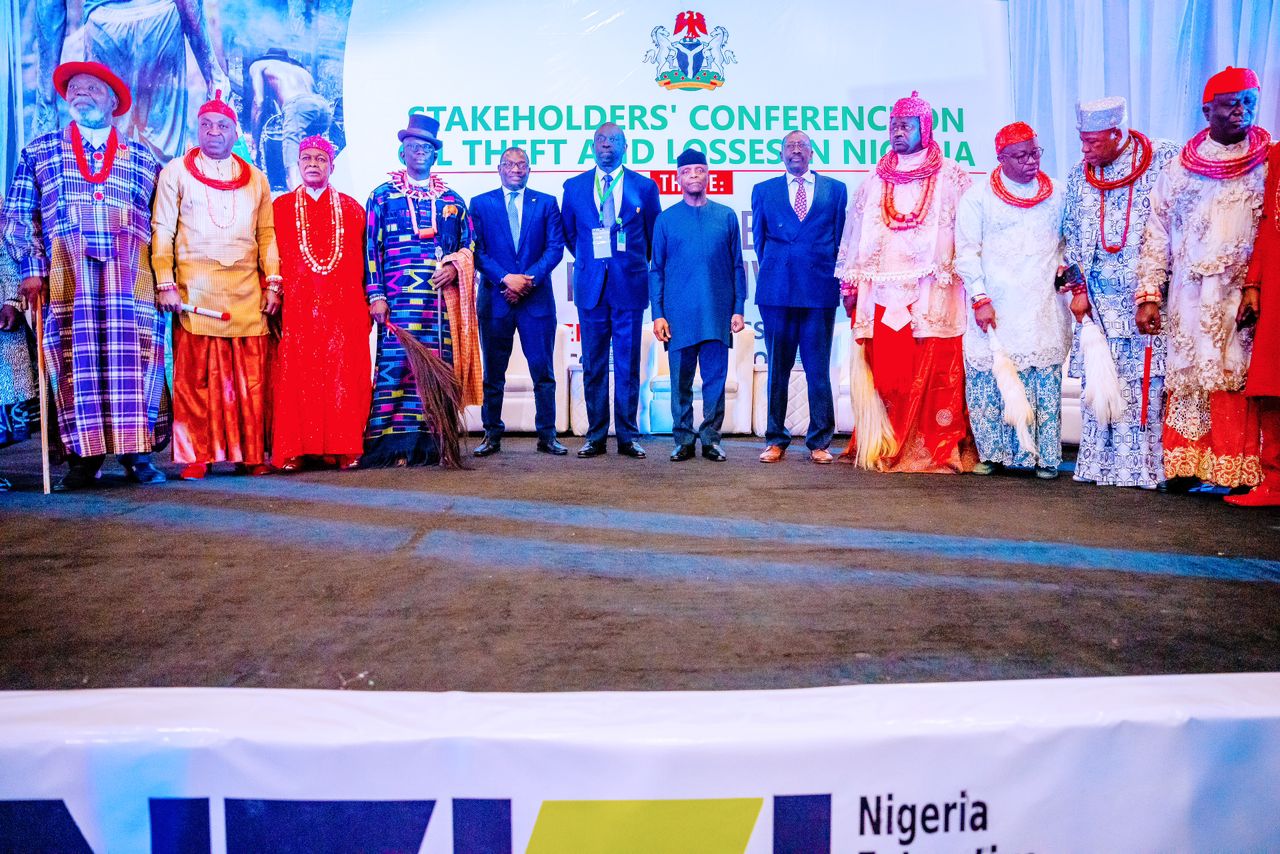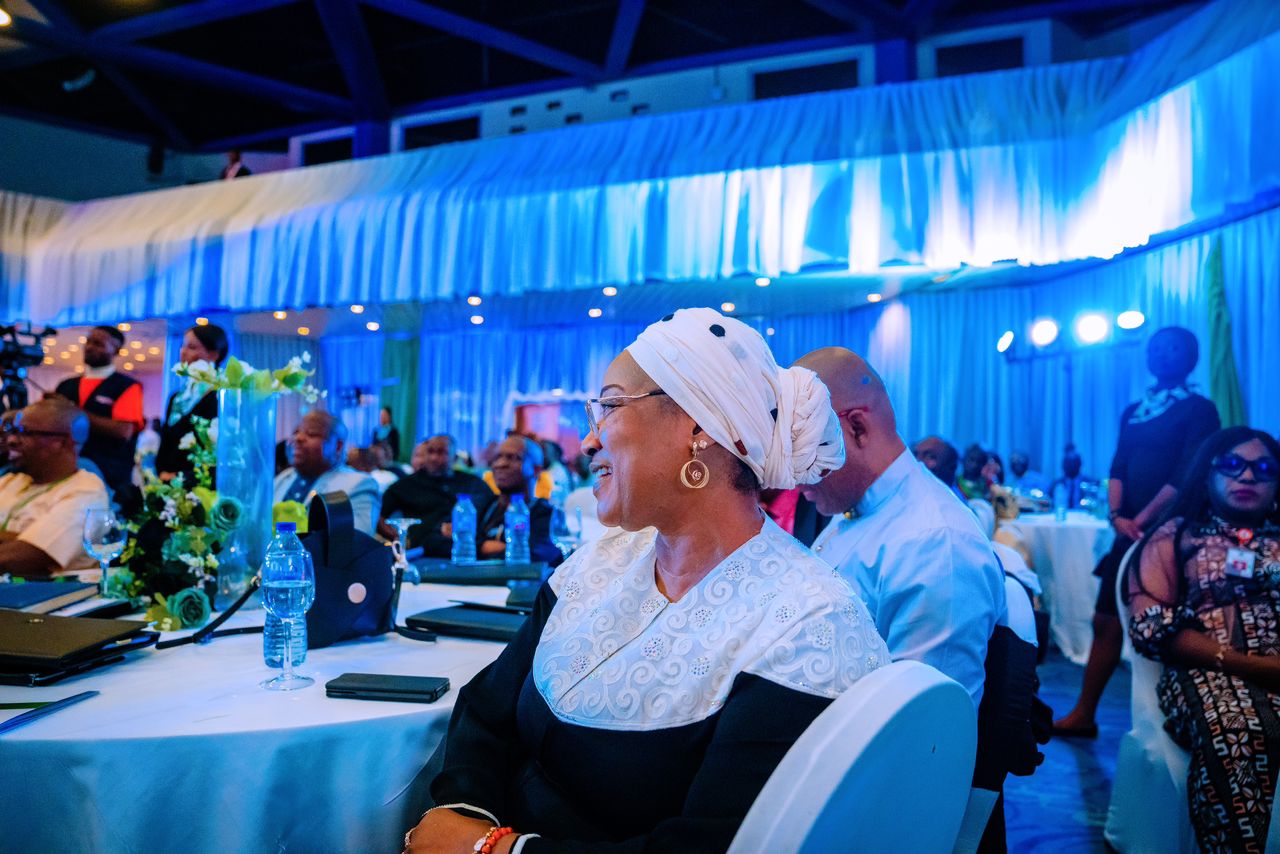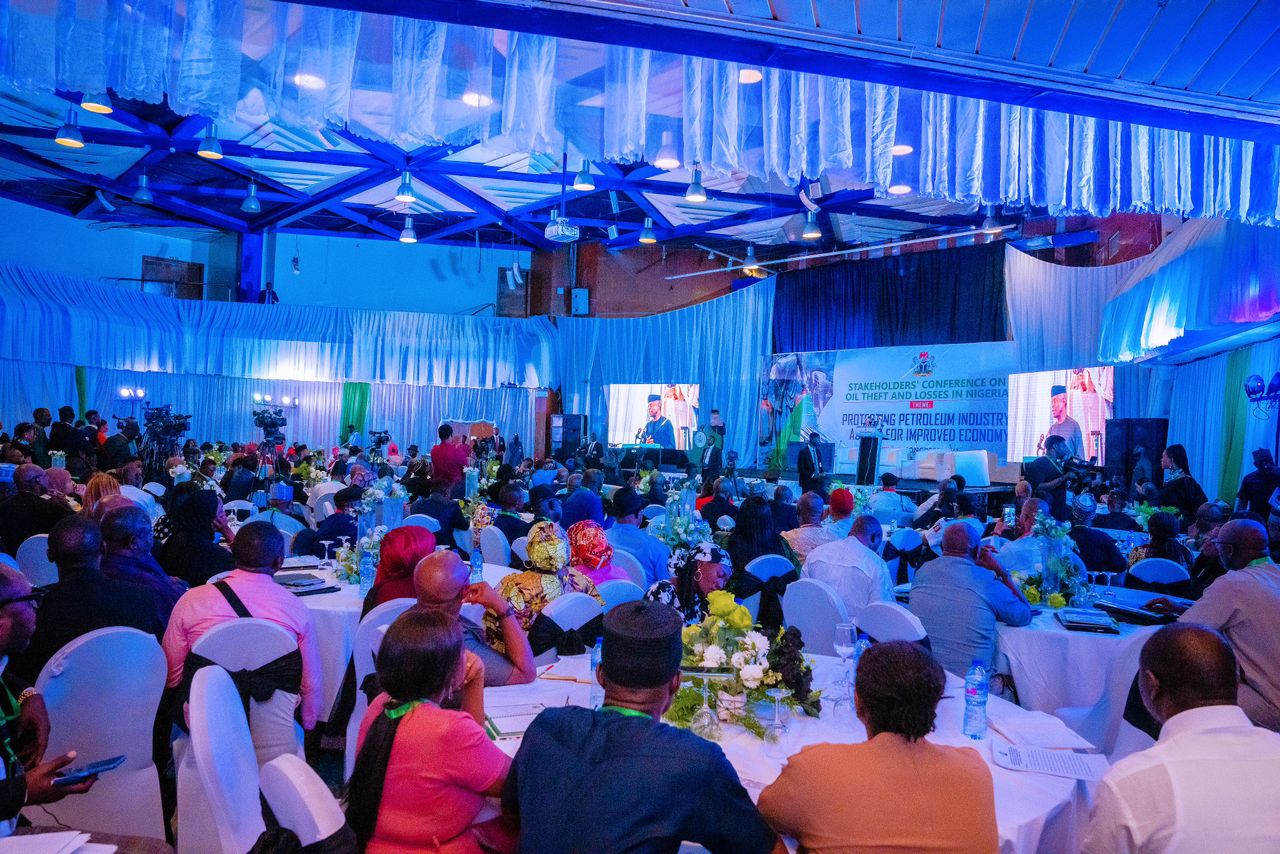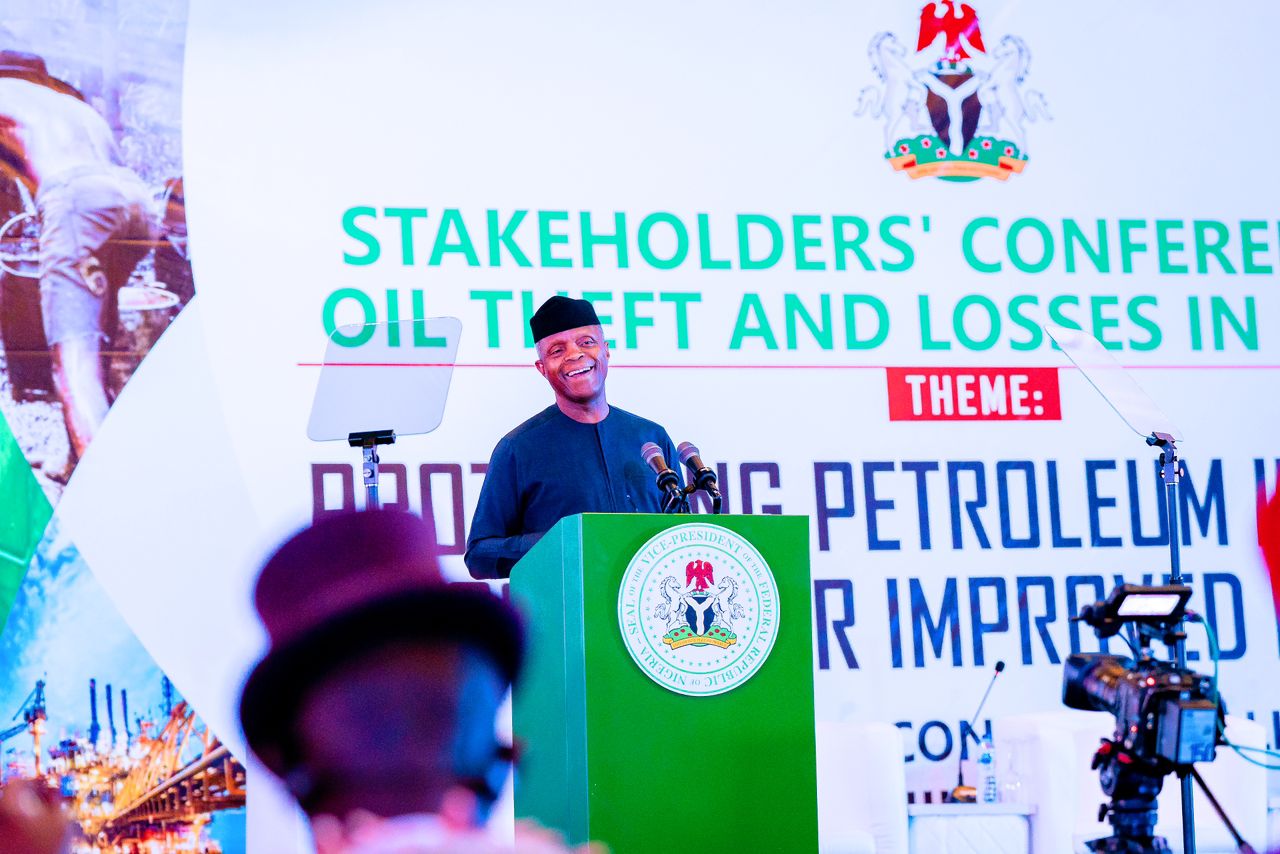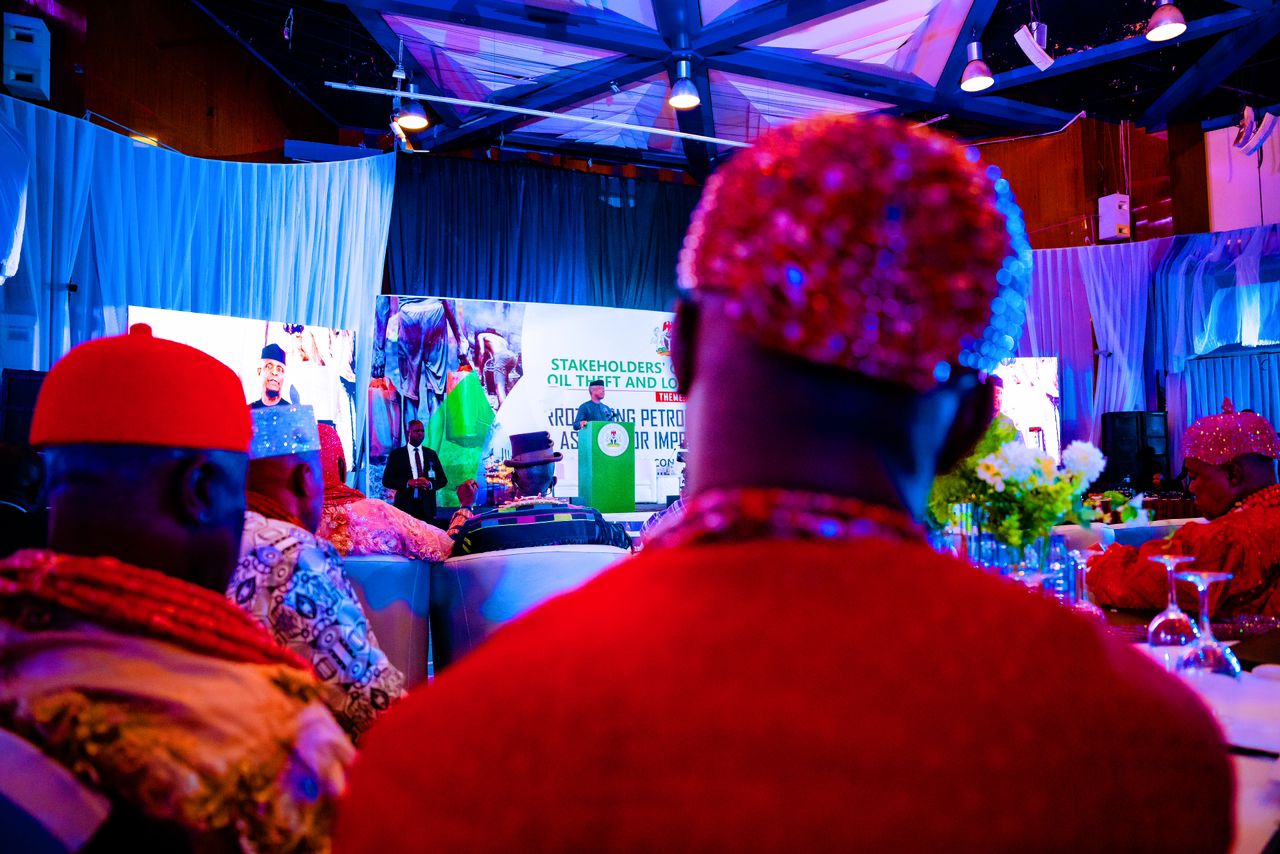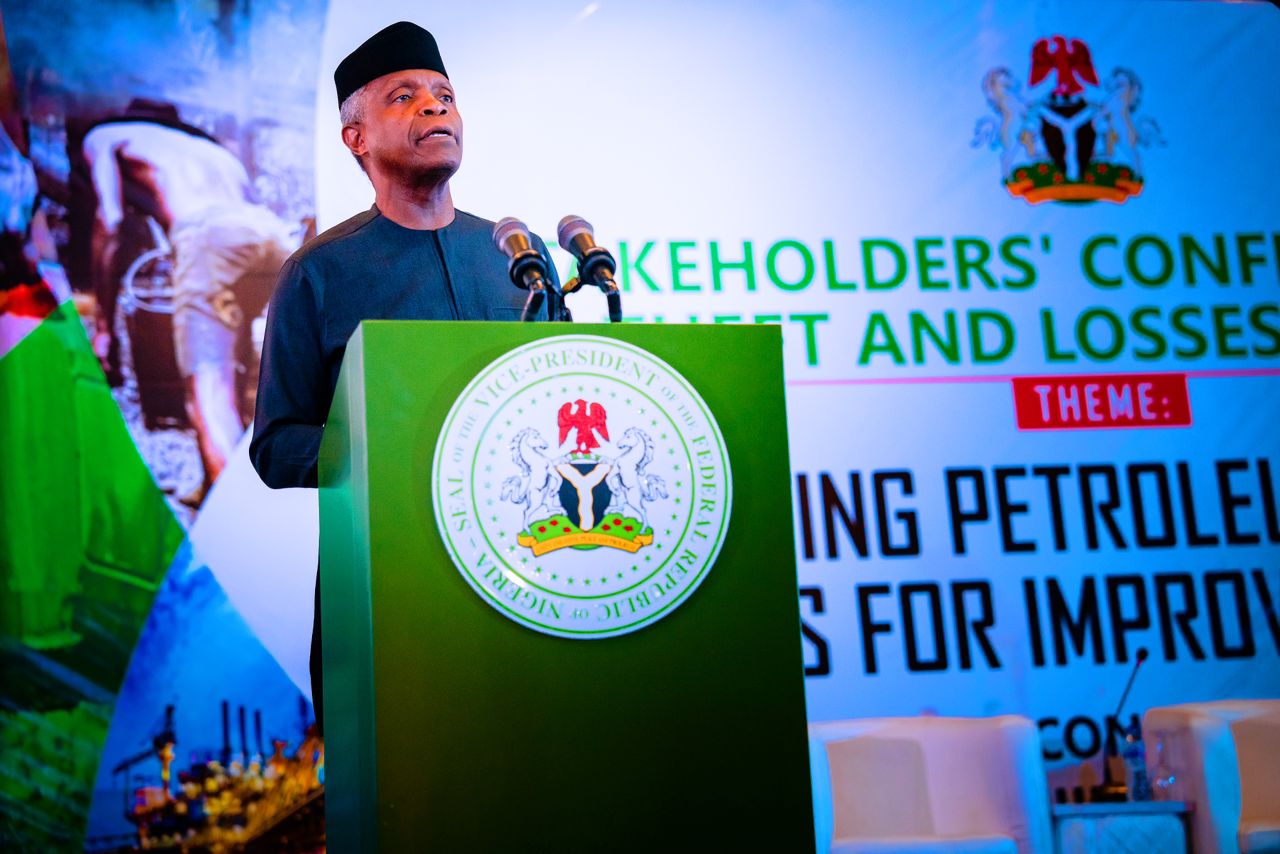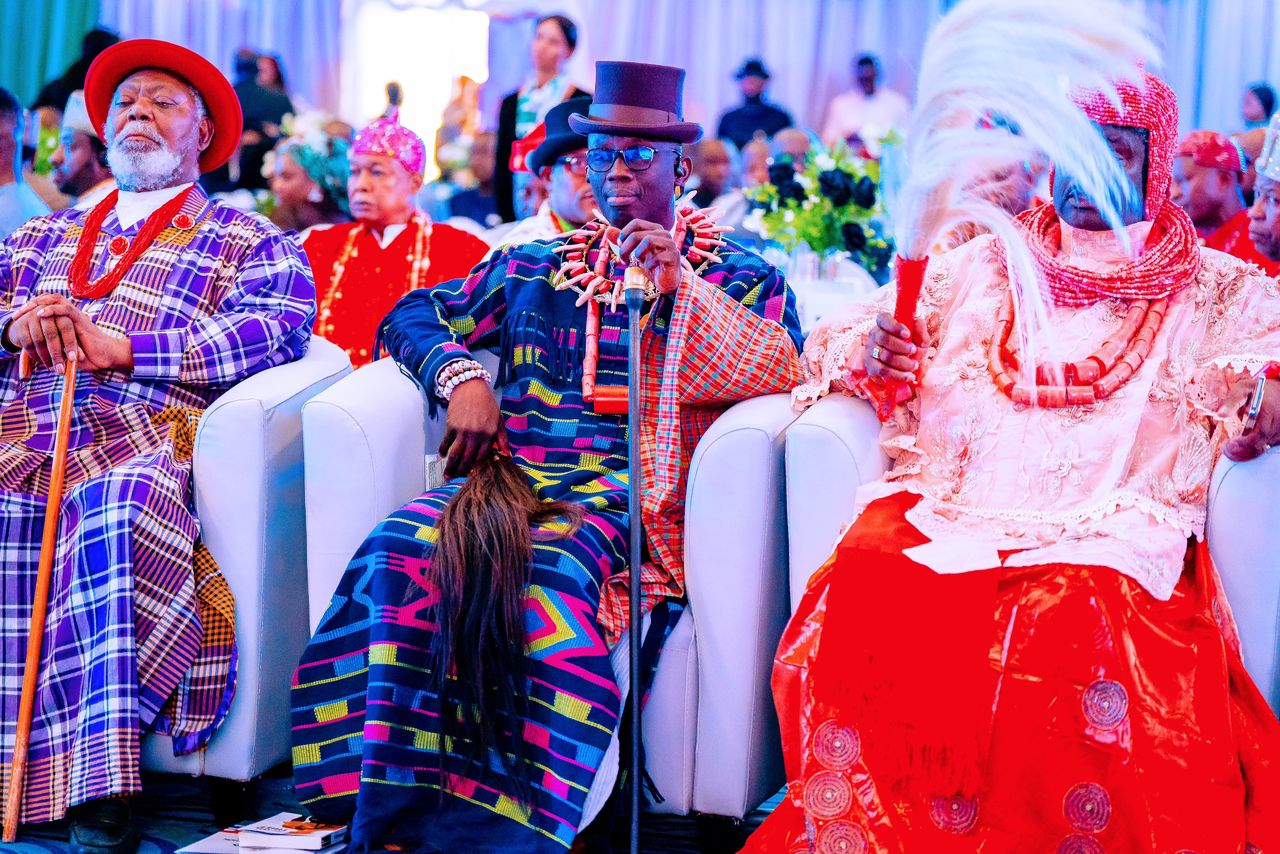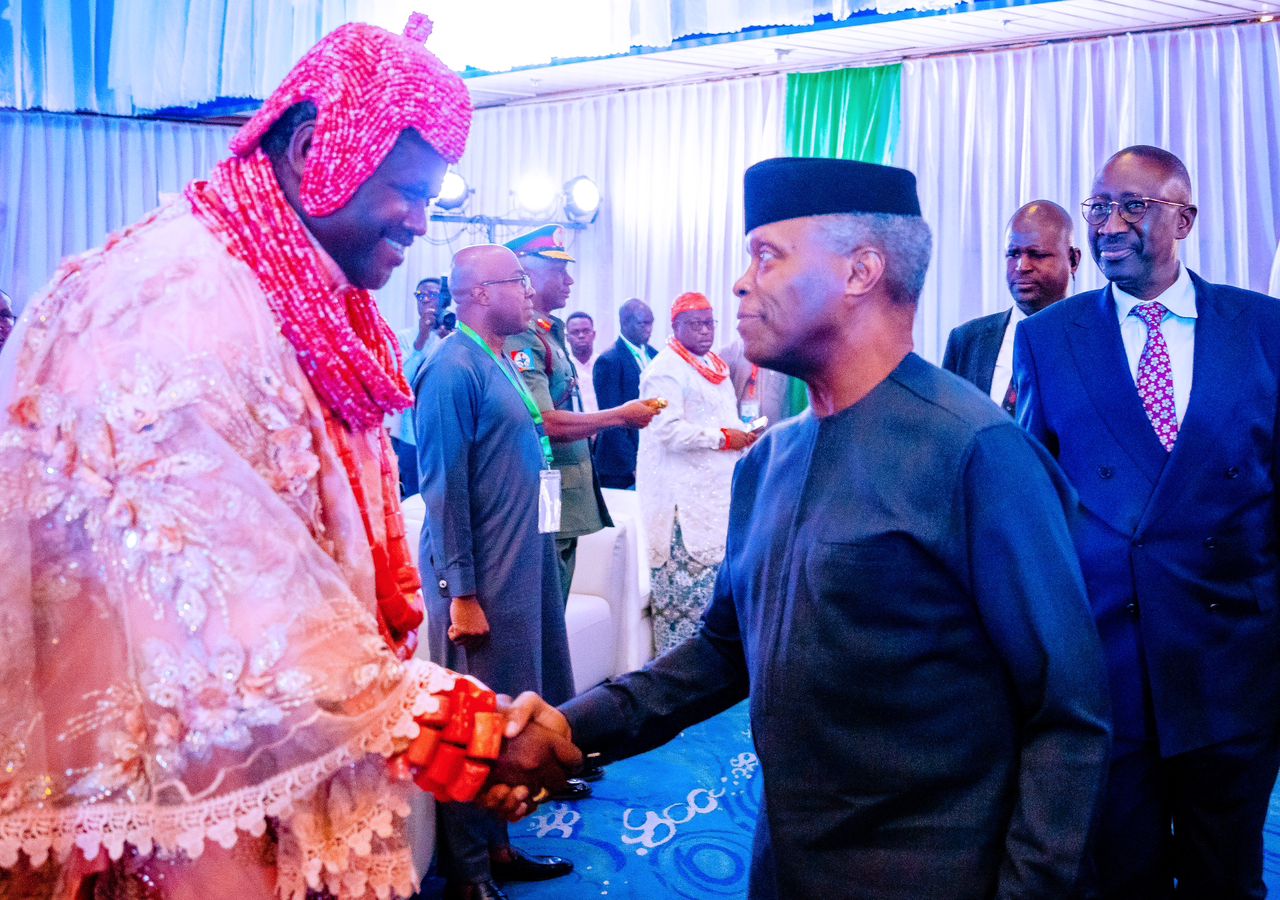Stakeholders’ Conference On Oil Theft And Losses In Nigeria
OPENING ADDRESS BY HIS EXCELLENCY, PROF. YEMI OSINBAJO, SAN, GCON, VICE PRESIDENT OF THE FEDERAL REPUBLIC OF NIGERIA, THE SPECIAL GUEST OF HONOUR AT THE STAKEHOLDERS’ CONFERENCE ON OIL THEFT AND LOSSES IN NIGERIA, AT TRANSCORP HILTON ON THE 21ST OF FEBRUARY 2023
PROTOCOLS
There is no way of overstating the importance of a conference on “Protecting Petroleum Industry Assets for Improved Economy”. Oil theft and sabotage of oil and gas assets are a clear and present danger to our economy and national security. Not only do they pose a serious threat to oil exploration and our energy economy, they also impact negatively on revenue accruals to the Federation and the business prospects of investors in the oil and gas sector.
If left unchecked, they will fuel a public finance crisis that will paralyze governance and leave our country extremely vulnerable to all of the shocks, some known and others unexpected. Oil and gas resources account for about 80 per cent of the Government’s foreign revenues exchange earnings and contribute about 6 per cent of the country’s GDP. Large-scale theft of crude oil, therefore, undermines our efforts to optimize these resources.
The Nigeria Extractive Industries Transparency Initiative (NEITI) puts the audited figures of oil theft and losses at something in the order of 619.7 million barrels of crude oil daily, and this is valued at over US$46.16 billion or N16.25 trillion. And all of these losses occurred between 2010 and 2020. In addition, Nigeria lost 4.2 billion litres of petroleum products from refineries valued at US$1.84 billion at the rate of 140,000 barrels per day, from 2009 to 2018. This is just an average because there are peaks when we have seen losses in the order of 300,000 -400,000 barrels in one day.
So, the total value of crude oil losses between 2009 and 2020 is higher than the size of Nigeria’s foreign reserves and almost ten times Nigeria’s oil savings in the Excess Crude Account. It is no exaggeration to say that our oil and gas sector is facing the most serious threat it has confronted in the over half a century of its existence.
The theft of crude oil and the accompanying attacks on our energy infrastructure especially in the Niger Delta have, since the inception of our administration, been of utmost concern. Within a year of the Buhari Administration being in office, our oil installations were sabotaged by militants especially the Forcados Export Pipeline and the Escravos Gas Pipeline.
The effect was such that the annual average crude oil production fell from 1.748million barrels per day in 2015 to 1.427 million barrels per day in 2016. Indeed, at some stage at the peak of the attacks, we were producing less than 1million barrels per day. Sometimes falling to about 700,000 – 800,000 barrels in one day.
To compound the situation this loss of production came at a time of very low oil prices. By January 2016, Brent Crude was trading at $30 per barrel as opposed to its average price of $52 per barrel in 2015.
Given the importance of oil and gas for federation revenues and export earnings, it was no surprise that the economy went into recession in 2016 for the first time in twenty years with the economy contracting by 1.6 per cent that year.
It was clear to the government at the time that to speedily exit the recession, we needed to ensure that oil production went back to its over 2 million barrels per day levels.
In the wake of the sabotage of our key oil installations, the President and I had a series of discussions on what to do. We finally agreed it was important that I undertook a tour of all oil-producing states, especially in the Niger Delta, to engage with stakeholders and get a measure of the grievances that formed the backdrop to the sabotage of the oil installations. This was not just a visit to State capitals but entailed visiting key oil installations, and key producing communities and talking to all segments, especially traditional rulers and community leaders.
As a result of those engagements and based on the feedback we had received from the communities, we were able to draw up the New Vision for the Niger Delta which helped to calm the situation and stem the attacks on oil facilities. These efforts led to significant success. According to the 2018 Nigeria Oil and Gas Industry Annual Report, crude oil production, the estimated daily average production for that year was 2.12million barrels per day.
This upward trend was upended very soon after by the COVID-19 crisis in 2020. So, just by being able to go to these communities and speak to the various communities, and address some of their concerns, especially involving the communities in the process of addressing these concerns, we were able to stem the tides of attacks on oil installations and facilities and raise all production significantly as we have heard.
It is against the backdrop of huge production cuts and revenue losses that the National Economic Council (NEC) which I chair, set up an Ad-hoc Committee in 2019 under the chairmanship of the Governor of Edo State, His Excellency, Governor Godwin Obaseki, to ascertain the magnitude of oil theft and losses in Nigeria and recommend appropriate remedial measures.
I think it is important to understand that immediately after the successes we experienced in 2018 and addressing some concerns of the oil-producing communities, we began to experience again shortly thereafter, especially in 2019 and subsequently, increasing losses, theft and of course, some of what you have heard, the very detailed presentation a moment ago.
Most of the recommendations of the Ad-hoc Committee informed the Petroleum Industry Act, 2021 and you would find that many of the concerns that have been expressed in the communities over the years were actually made provisions in the P.I.A. But, even so, acts of vandalism of oil and gas infrastructure, oil theft as well as low production yields, are still being reported in damaging and unacceptable proportions.
The current administration, of course, is confronting these acts of economic terrorism on multiple fronts and with a range of tools.
First, we have invested significantly in scaling up our maritime security architecture. In June 2021, President Muhammadu Buhari flagged off the Integrated National Security and Waterways Protection Infrastructure Project is otherwise known as the Deep Blue Project. It is a collaborative multiagency effort involving the Armed Forces, the Police and the Department of State Services (DSS), the Nigerian Maritime Administration and Safety Agency (NIMASA) and jointly led by the Ministry of Transport and the Ministry of Defence.
The project provides air, naval and land assets for surveillance, policing, and search and rescue operations in our coastal waters and our exclusive economic zones.
The following month, I was at the Navy Headquarters where we commissioned Falcon Eye, a maritime surveillance facility which by itself, is a collection of sensors installed along our nation’s coastline. It is designed to provide actionable intelligence in real-time on maritime security threats and enable the swift and pre-emptive interdiction of criminals. Taken together, these two initiatives are huge investments in making our waters safe for energy, and commerce and inhospitable for the criminals that violate our vital economic interests.
So, we already have 2 major projects, as I have pointed out. The Falcon Eye is the latest. These projects of course are meant to assist in the surveillance of our coastal waters and to be able to precisely pinpoint some of the criminal activities that are going on in the coastal waters.
Having said this, we also recognize that scaling up our maritime security architecture is only one piece of the puzzle. The material conditions of the Niger Delta have been unfortunately conducive for the activities of criminal syndicates preying on our energy infrastructure in the area. The Ad-hoc Committee set up by the National Economic Council acknowledged this by recommending that the Governors of the oil-producing states step up actions to develop their communities with the 13 percent derivation allocation accruing to them. While the Federal Government must make the efforts that it is making, it is also important that at the local level, Governors expend the derivation funds on community development.
The Committee also determined that “creating employment opportunities for the youths of the oil producing communities and making petroleum products available in these communities as this will go a long way to reduce hardship and criminality in the region.”
In this regard, one of the ideas we pursued under the New Vision for the Niger Delta was the discouragement of illegal artisanal refining by licensing modular refineries. And this was the feedback we gathered from the local communities.
Many of the local communities were saying, “look, you keep attacking artisanal refineries where we make an income, why not involve us in the building of modular refineries?” And at some point, Federal Government licensed almost 38 modular refineries.
The refineries were designed to be privately owned, but with a small percentage of shares owned by the host communities. It was hoped that this could draw in the illegal refiners and thus shut down one of the most potent sources of sabotage of oil assets especially the destruction of pipelines.
I think this move to a certain extent was successful, but one thing we must understand is that artisanry refinery is extremely lucrative for the young men who engage in it. And because it is so lucrative, and because the oil is obtained at no cost whatsoever, it is extremely difficult to stop even by its replacement of it by modular refineries and by all such efforts.
We recognize that addressing the situation in the region calls for concerted transformative efforts across all tiers of government. In this respect, President Buhari enacted the Petroleum Industry Act of 2021 as the centrepiece of legislation aimed at revitalizing the oil and gas industry. Among other things, the Act stipulates elaborate provisions to accommodate the needs of the Host Communities in the oil and gas-producing areas. The aim of these provisions is to assuage their sensibilities, give them a sense of belonging and foster unity of purpose with oil companies for the mutual benefit of all.
The Act also aims to foster sustainable prosperity within the Host Communities, by providing them with direct social and economic benefits. In addition, oil companies operating on behalf of Joint Venture Partners (JVP) are required to contribute 3 to 5 per cent of upstream companies and 2 per cent for other companies of their actual operating expenditure, in the immediately preceding calendar year to the Host Communities Development Trust Fund. This Fund has tax-exempt status. This is in addition to the existing contribution of 3 per cent to the Niger Delta Development Commission (NDDC).
With the provisions of the Petroleum Industry Act, the Host Communities stand to gain immensely from sustained production. This is why the communities should work in unison with other stakeholders to ensure increased production yields and the security of oil and gas infrastructure for mutually derivable benefits.
Conversely, where disruptions of production, oil theft and losses occur, such communities and States inevitably stand to lose immensely, given that the benefits to the Host Communities are based on the ad valorem principle. It’s important in order to gain the benefits of the legislation, the host communities themselves must ensure continued production, and must assist the Government as well as all the agencies involved in stemming oil and gas theft and losses.
And I think this is important because once the host communities, especially individuals who may be involved in this action are sensitised as to the importance of ensuring that the Act works, ensuring that the legislation works to their benefit, then, I think that things may well improve. And this would involve actual engagement. Sometimes, it’s important to go and speak to people, and actually engage with these local communities.
I recall that when we went to speak to the local communities, of course, there were a lot of suspicions, back and forth. The local communities were suspicious of the Government and Government itself was fearful that something may go wrong. It was also suggested that all the communities and its leaders needed was for us to carry a large sum of monies to them and the President did not accept this proposition.
So, when I went to visit those communities, instead of taking large monies to them, in fact, the big surprise was that when we got to those local communities, we got money instead. When I visited Gbamaturu, the local community gave me N250,000 as a gift. In addition to that, I was given a wife to take home with me. Of course, I had to point out to His Royal Highness that that might cause a bit of a problem for me when I arrive with the young lady. My wife is not exactly the sort of person who would accept that sort of proposition.
But let me say that engaging the communities is very important, and we must never think that engagement is enough. Constant and continuous engagement is very crucial, especially engaging face-to-face with people. There’s nothing better than that so that we are able to better understand what’s going on and proffer solutions jointly.
Now, without pre-empting the presentations to be made by distinguished resource persons on matters of concern, let me comment on some of the contentious issues associated with oil theft and losses in Nigeria. It is public knowledge that clandestine syndicates perpetrate these economic crimes using various strategies. There are reports of oil tankers that illegally load crude without due authorization from the appropriate regulatory authorities. We have seen from earlier presentations some vessels earlier destroyed.
At the same time, it has been argued that organized crime of such an industrial scale cannot be carried out with the compromise and complicity of critical institutions. This assertion continues to be contested by relevant authorities but remains a topical issue of concern. In addition, there are allegations of malpractices at the loading terminals resulting in under-declaration of the quantity of crude loaded.
There are also issues of conflicting figures being presented as losses. Some sources attribute the losses to other issues not necessarily related to theft. These include shut-ins, force majeure, deferment, abandoned oil wellheads, non-production and metering errors and many other factors. These issues have been countered by some authorities as frivolous excuses for untenable revenue losses.
Regardless of what the core problems are, we can all agree that the persistence of crimes of this magnitude severely challenges the credibility of governing authorities. It is an affront to our claims of sovereignty that an industry so crucial to our collective well-being is under such brazen assault by criminal elements.
A crime so grievous cannot simply be a subject of summitry; people must do their jobs and if they are unable to do them, then there must be an accounting for such failures. We must hold people and authorities to account. Institutional and personal reputations are at stake.
This, therefore, is the cardinal reason we are gathered here today. I implore you to exhaust discussions on the issues. With the profile of the resource persons, high-level moderators and discussants, I am confident that the subject matter will be discussed extensively, and appropriate recommendations proffered to achieve the overarching objective of this conference. I urge you to think out of the box and be courageously innovative in proffering your recommendations.
I commend the dynamic National Security Adviser, Major General Babagana Monguno, CFR and the very able Chair of the Special investigative panel on oil thefts and losses, Major General Barry T Ndioumu, and his colleagues on the Panel, for organizing this Conference.
While it is coming at the twilight of this administration, the President is committed to captaining the ship of governance to the very last hour. But more importantly, our administration is committed to leaving our best actions, thoughts and ideas for the use of the next administration and the benefit of our Nation.
Ladies and Gentlemen, it is now my special pleasure and privilege to declare this Conference open.
Thank you very much.


